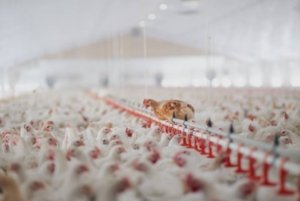Cruelty-Free Living

In recent years, the beauty and fashion industry has been undergoing a significant transformation. More and more consumers are becoming conscious of the ethical implications of their choices and are choosing to embrace cruelty-free living. The shift towards vegan beauty products and a vegan lifestyle is not just a trend; it’s a reflection of a growing awareness about the ethical reasons behind this choice. In this blog, we’ll explore the ethical foundations of choosing a vegan lifestyle and how it extends beyond just what you eat into the realm of beauty and personal care products.
The Ethical Compass of Vegan Living
One of the core ethical reasons for choosing a vegan lifestyle is the concern for animal welfare. Animals are sentient beings that experience pain, fear, and suffering, just like humans. The beauty and cosmetics industry has a history of animal testing, where products are tried on animals to assess their safety for human use. This practice subjects animals to unnecessary suffering, often resulting in injury or death. Choosing vegan beauty products means opting for brands that abstain from such cruelty and prioritize the well-being of animals.
Environmental Sustainability
The ethical considerations of a vegan lifestyle also extend to the environment. Animal agriculture is a major contributor to greenhouse gas emissions, deforestation, and habitat destruction. It depletes valuable natural resources, such as water and land. By adopting a vegan lifestyle, individuals can significantly reduce their ecological footprint, thus contributing to the preservation of our planet for future generations.
Health and Well-Being
Veganism isn’t just about the welfare of animals and the environment; it’s also about prioritizing one’s own health. Many studies have shown that a well-balanced vegan diet can lead to improved overall health, lower risk of chronic diseases, and increased vitality. By making ethical choices for your body, you’re also taking a stand against the unethical practices of industries that harm both animals and human health.

Vegan Beauty – Cruelty-Free and Kind
The beauty industry has been gradually but significantly shifting towards cruelty-free products. This shift is a response to both ethical concerns and changing consumer demands. Several key factors contribute to this transformation:
Ethical Consumerism: More consumers are embracing ethical consumerism, making informed choices that align with their values. They are increasingly seeking out products that are not tested on animals, pushing companies to adapt their practices to meet this demand.
Regulatory Changes: Many countries and regions have implemented or strengthened regulations against animal testing in cosmetics. These regulations are forcing brands to reevaluate their testing methods and prioritize cruelty-free alternatives.
High-Profile Advocacy: Celebrities, influencers, and animal rights organizations have been advocating for cruelty-free beauty. Their platforms have brought significant attention to the issue, encouraging consumers to make more ethical choices.
Animal-Derived Ingredients
In addition to cruelty-free testing, many vegan beauty products are formulated without any animal-derived ingredients. Traditional cosmetics often contain substances like lanolin, collagen, and beeswax, which are sourced from animals. Vegan beauty products opt for plant-based alternatives, ensuring no harm is inflicted on animals during the production process.
Beeswax: Traditional lip balms and some lotions contain beeswax. Vegan alternatives often use plant-based waxes like candelilla wax or soy wax.
Lanolin: Lanolin, a common moisturizing ingredient, is derived from sheep’s wool. Vegan alternatives use plant-based emollients such as shea butter or cocoa butter.
Collagen: Collagen is often used in anti-aging skincare products. Vegan alternatives incorporate ingredients like hyaluronic acid and peptides derived from plants.
Carmine: Carmine is a red pigment obtained from crushed cochineal insects. Vegan makeup uses natural red pigments from sources like beetroot and berries.
Ethical Sourcing and Transparency
Sustainable Ingredients: Vegan beauty brands prioritize using sustainably sourced plant-based ingredients. These ingredients are often chosen for their minimal environmental impact and their ability to provide effective skincare and cosmetics.
Recyclable or Biodegradable Packaging: Many vegan beauty brands take extra care to ensure their product packaging is eco-friendly. This includes using recyclable materials or biodegradable options, reducing waste and environmental impact.
Cruelty-Free Certifications: To build trust with consumers, many vegan beauty brands obtain cruelty-free certifications from reputable organizations. These certifications confirm that their products are not tested on animals and that they adhere to cruelty-free principles.
By embracing these practices, vegan beauty brands uphold the ethical values of cruelty-free living while also promoting sustainability and transparency in the beauty industry.
Alternative Testing Methods
In addition to avoiding animal testing, cruelty-free and vegan beauty brands actively seek alternative testing methods that do not involve animals. These modern techniques are not only ethical but also often more accurate and efficient:
In Vitro Testing: In vitro testing involves using human cell cultures and tissues to assess the safety and efficacy of products. This method eliminates the need for animal testing and provides more relevant results for human use.
Artificial Skin Models: Advanced artificial skin models have been developed, offering a humane way to test cosmetics. These models mimic human skin’s behavior, allowing researchers to study product effects without harming animals.
Computer Modeling: Computer modeling and simulation are powerful tools for predicting a product’s impact on the skin and body. They reduce the need for physical testing, aligning with the ethical stance against animal testing.
By choosing cruelty-free and vegan beauty products, consumers play an active role in supporting innovation in the beauty industry. Vegan brands often invest in research and development to find creative alternatives to animal-derived ingredients and traditional testing methods. This fosters a culture of constant improvement and ethical progress in the beauty sector.

The Power of Consumer Choice
One of the most compelling ethical reasons to choose a vegan lifestyle is the power it gives you as a consumer. Your purchasing decisions directly influence the practices of businesses. By choosing cruelty-free and vegan products, you signal to the beauty industry that these ethical values matter to you. As more consumers make these choices, companies are motivated to shift their practices to meet the growing demand for ethical products.
The ethical principles of vegan living extend beyond individual choices and can catalyze broader social change. By advocating for cruelty-free and vegan products, individuals are contributing to the reduction of animal testing and the promotion of a more ethical and sustainable beauty industry. Consumer choices can inspire companies to adopt more humane and environmentally friendly practices.
Global Sustainability
The choices we make as individuals have a global impact. Animal agriculture is a major driver of deforestation, water pollution, and the depletion of natural resources. By choosing a vegan lifestyle, individuals contribute to global sustainability efforts, helping to mitigate the negative effects of animal agriculture on the environment.
Ethical Leadership
Choosing vegan beauty products and embracing a cruelty-free lifestyle aligns with the growing global movement towards ethical living. This movement transcends borders and cultural boundaries, uniting people in the shared values of compassion, environmental preservation, and human health. As more individuals join this movement, it gains momentum and contributes to a more compassionate and sustainable world
The Accessibility Issue
One common challenge people face when transitioning to a vegan lifestyle is the perceived lack of accessibility to vegan beauty products and food. However, in recent years, the availability of vegan options has significantly increased. Many supermarkets, drugstores, and online retailers now offer a wide range of cruelty-free and vegan products.
The Nutritional Concern
Another misconception about veganism is that it may lead to nutritional deficiencies. However, with proper planning and a well-balanced diet, it is entirely possible to meet all your nutritional needs on a vegan diet. The ethical reasons for choosing a vegan lifestyle can be aligned with a commitment to maintaining good health.

Inspiring Change
Inspiring change through conscious consumerism is a powerful way to advocate for cruelty-free and vegan living. Here’s how you can be a conscious consumer and make a difference:
Research Products and Brands: Before making a purchase, research products and brands to ensure they align with your ethical values. Look for cruelty-free and vegan certifications and check ingredients lists for any animal-derived components.
Support Ethical Brands: Choose to support brands that are committed to cruelty-free and vegan practices. Your support contributes to their growth and success, sending a message to the beauty industry that ethical choices matter.
Share Your Choices: Share your experiences with cruelty-free and vegan products with your friends, family, and social networks. By discussing your positive experiences, you can encourage others to make ethical choices in their beauty routines.
Supporting Ethical Brands
To take a step towards a vegan lifestyle, you can start by researching and supporting ethical brands that align with your values. Explore their products, read reviews, and engage with the community of like-minded individuals who share your ethical concerns.
Frequent Their Products: Purchase and use products from ethical brands. This not only benefits your personal care routine but also contributes to the brand’s success.
Provide Feedback: Share feedback with ethical brands about their products, packaging, and values. Your input can help them improve and meet the evolving demands of conscious consumers.
Promote Ethical Brands: Use your influence to promote ethical brands through social media, blogs, or word-of-mouth recommendations. Your advocacy can help these brands reach a wider audience.
Spreading Awareness
Finally, as an advocate for ethical living, you can also play a part in spreading awareness. Share your journey towards a vegan lifestyle, educate others about the ethical reasons behind it, and encourage others to make compassionate choices in their beauty and personal care routines.
In conclusion, cruelty-free living and choosing a vegan lifestyle are not merely personal choices but ethical decisions that have far-reaching implications. By prioritizing animal welfare, environmental sustainability, and personal health, individuals can make a positive impact on the world. The shift towards cruelty-free beauty products and vegan living reflects a collective desire to create a more ethical, compassionate, and sustainable future for all living beings on our planet.

